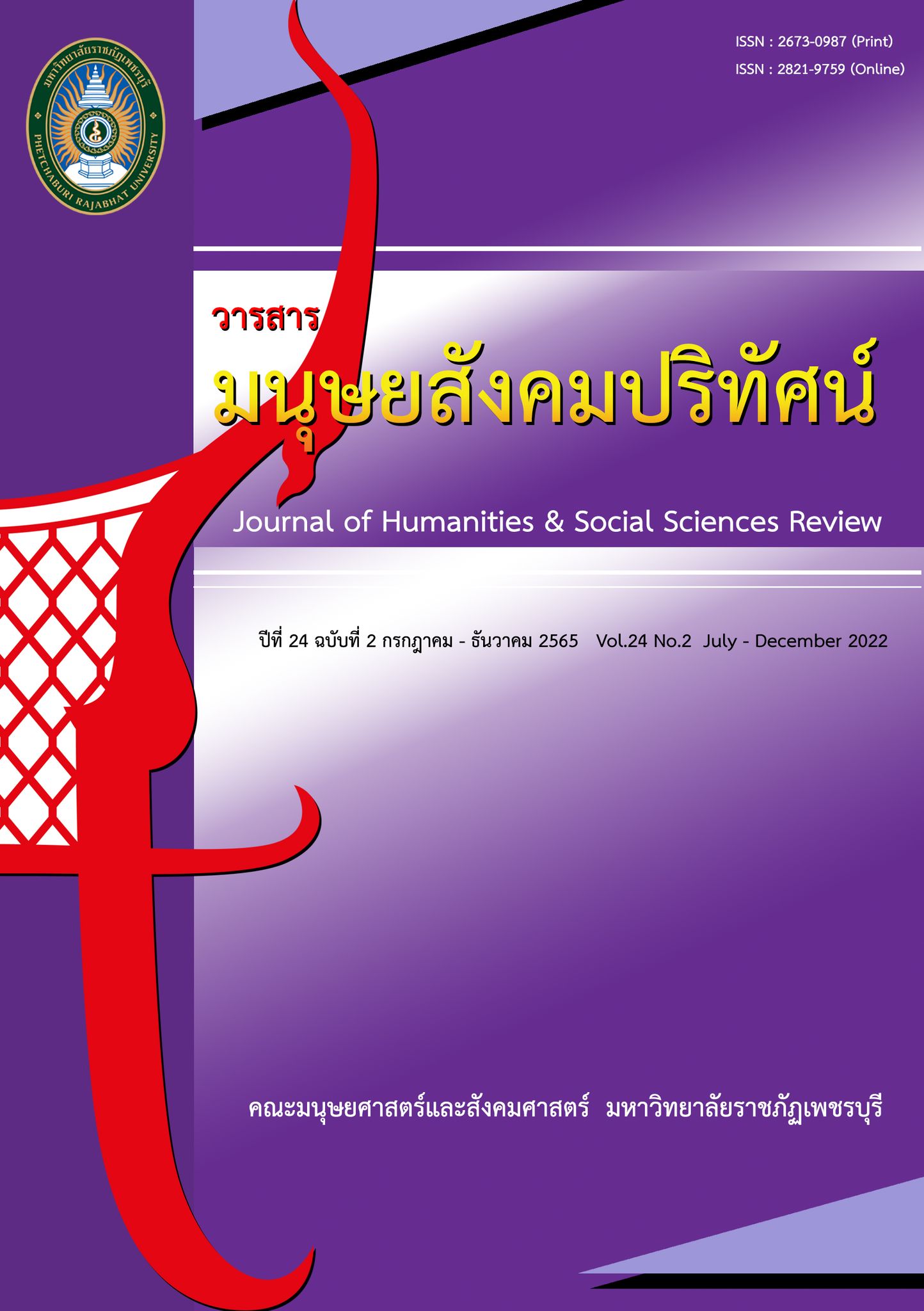A Study of English Learning Achievement of 4th year Students, Phetchaburi Rajabhat University through E-learning: DynEd
Main Article Content
Abstract
The purpose of this research was to compare the English learning achievements of 4th-year students at Phetchaburi Rajabhat University through E-learning: DynEd. The samples were 471 of the 4th year students, semester 2 of the academic year 2020, Phetchaburi Rajabhat University, Muang District, Phetchaburi Province, which was derived from a purposive sampling. The DynEd program was used as a tool and statistically analyzed by mean, standard deviation, and t-test for independent samples. The research finding revealed that after studying through E-learning: DynEd, the English learning achievement of 4th-year students was higher than before studying at a statistical significance level of 0.01.
Article Details
1. Any views and comments in the article are the authors’ views. The editorial board has not to agree with those views and it is not considered as the editorial board’s responsibility. In case, there is any lawsuit about copyright infringement, it is considered as the authors’ sole responsibility.
2. The article copyright belonging to Faculty of Humanities and Social Sciences, Phetchaburi Rajabhat University are copyrighted legally. Republication must be received direct permission from the authors and Phetchaburi Rajabhat University in written form.
References
กระทรวงศึกษาธิการ. (2564). นโยบายการจัดการศึกษาของกระทรวงศึกษาธิการ ปีงบประมาณ 2564-2565. สืบค้นเมื่อ 20 มกราคม 2564, จาก https://moe360.blog/2021/06/30/education-management-policy/.
กุสุมา เลาะเด. (2560). การประเมินผลการใช้งานโปรแกรมเรียนรู้ภาษาอังกฤษด้วยตนเอง “SPEEXX”: กรณีศึกษามหาวิทยาลัยราชภัฏวไลยอลงกรณ์ในพระบรมราชูปถัมภ์. วารสารวไลยอลงกรณ์ปริทัศน์ (มนุษยศาสตร์และสังคมศาสตร์), 7(2): 30-43.
ประชาชาติธุรกิจ. (2561). EFการสำรวจการใช้ภาษาอังกฤษเป็นภาษาที่ 2 ทั่วโลก เผยอันดับของไทยรั้งท้ายในเอเชีย. สืบค้นเมื่อ 6 มกราคม 2564, จาก https://www.prachachat.net/education/news-250827.
พิมพร วัฒนากมลกุล และมโนรัตน์ สมคะเนย. (2564). การพัฒนาทักษะการเรียนรู้คำศัพท์ภาษาจีน โดยการใช้เกมผ่านแอปพลิเคชัน. กรุงเทพฯ: คณะศิลปศาสตร์ มหาวิทยาลัยเทคโนโลยีราชมงคลรัตนโกสินทร์ บพิตรพิมุขจักรวรรดิ.
ภัทรา โหงม่าง. (2543). ปัจจัยที่มีผลสัมฤทธิ์ทางการเรียนวิชาภาษาอังกฤษของนักเรียนชั้นประถมศึกษาปีที่ 6 กลุ่มโรงเรียนบูรพาประเทืองวิทย์ สังกัดสำนักงานการประถมศึกษา อำเภอแม่อาย จังหวัดเชียงใหม่. การค้นคว้าแบบอิสระศึกษาศาสตรมหาบัณฑิต บัณฑิตวิทยาลัย มหาวิทยาลัยเชียงใหม่.
มหาวิทยาลัยราชภัฏเพชรบุรี. (2562). ยุทธศาสตร์การพัฒนามหาวิทยาลัยราชภัฏเพชรบุรี ระยะ 20 ปี (พ.ศ. 2560 - 2579). สืบค้นเมื่อ 20 ธันวาคม 2564, จาก https://plan.pbru.ac.th/detail.php?id=
&St=B.
มาลีวัล เลิศสาครศิริ จุรีย์ นฤมิตเลิศ และกิติยา สมุทรประดิษฐ์. (2564). ปัจจัยที่มีผลต่อพฤติกรรมการเรียนผ่านระบบออนไลน์ของนักศึกษาวิทยาลัยเซนต์หลุยส์ จากสถานการณ์โควิด-19. วารสารสุขภาพกับการจัดการสุขภาพ, 7(1): 13-27.
ศิริพร พูลสุวรรณ. (2553). การเปรียบเทียบผลสัมฤทธิ์ในการใช้บทเรียนออนไลน์ประเภทบัตรคํา (Flashcard) เรื่องคําศัพท์เทคนิคภาษาอังกฤษ วิชาสารสนเทศวิทยาศาสตร์และเทคโนโลยีของนักศึกษาระดับปริญญาตรี. กรุงเทพฯ: สาขาวิชาบรรณารักษศาสตร์และสารสนเทศศาสตร์ คณะมนุษยศาสตร์และสังคมศาสตร์ มหาวิทยาลัยราชภัฏสวนสุนันทา.
สุรสิทธิ์ วรรณไกรโรจน์. (2546). การเรียนรู้แบบออนไลน์แห่ง สวทช. สืบค้นเมื่อ 18 มกราคม 2564, จากhttp://www.thai2learn.com.
สำนักงานคณะกรรมการการศึกษาแห่งชาติ. (2545). พระราชบัญญัติการศึกษาแห่งชาติ พ.ศ.2542 และที่แก้ไขเพิ่มเติม (ฉบับที่ 2) พ.ศ.2545. สืบค้นเมื่อ 20 มกราคม 2564, จาก https://person.mwit.
ac.th/01-Statutes/NationalEducation.pdf.
อนุชา สะเล็ม. (2560). การประยุกต์ใช้ E-Learning ในกระบวนการเรียนการสอนวิทยาลัยเทคโนโลยีบริหารธุรกิจมีนบุรี กรุงเทพฯ. สารนิพนธ์ปริญญาวิทยาศาสตรมหาบัณฑิต สาขาวิชาเทคโนโลยีสารสนเทศ คณะวิทยาการและเทคโนโลยีสารสนเทศ มหาวิทยาลัยเทคโนโลยีมหานคร.
EF SET. (2021). The CEFR and EF SET. Retrieved April 5, 2021, from https://www.efset.org/cefr.
Inal, M. and Korkmaz, O. (2019). The effect of web based blended learning on students’ academic achievement and attitudes towards English course. Education and Information Technologies, 24: 2603-2619.


